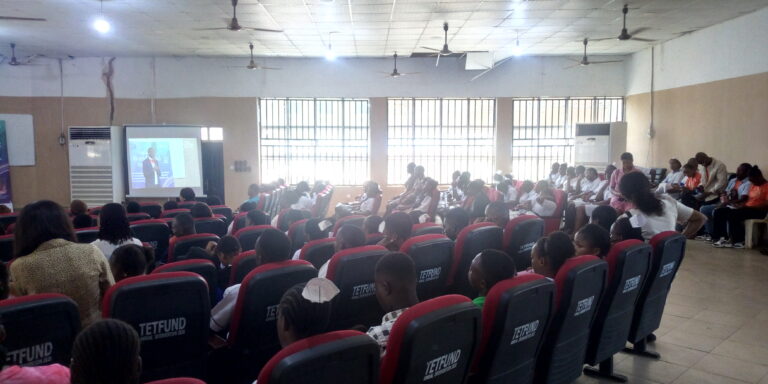
Nigerians stand to benefit immensely from regular hand hygiene through reduced transmission of diseases and higher productivity, thereby boosting the nation’s health status and standard of living among the comity of nations, experts that gathered at this year’s World Hygiene Day, at the University of Benin Teaching Hospital (UBTH), have said.
They also added that the observance of this simple hygiene will reduce patient to patient transmission of diseases as well as prevent patient to healthcare worker, and from healthcare worker to patient transmission, among others.
According to the Federal Ministry of Health the 2024 World Hand Hygiene Day focused on promoting knowledge and capacity building of health and care workers through innovative and impactful training and education, on infection prevention and control, including hand hygiene. It added that observing proper hand hygiene helps prevent a lot of infections and deaths in healthcare settings.
This year’s programme at UBTH was well attended showing the importance healthcare workers, medical students, practitioners as well as the general public attached to personal hygiene.
The World Hand Hygiene Day is marked every year on 5 May, to raise awareness of the importance of handwashing to prevent the spread of infections.
Among the dignitaries that attended this year’s programme were the Chief Medical Director UBTH, Prof Darlington Obaseki; Dr Nora Eyo, state coordinator, WHO Edo State Office, who was also one of the guest speakers, and Dr Funmi Adio, senior registrar and resident in IPC, Department of Public Health, Community Medicine, UBTH; medical students, and other members of the university community.
Dr Tochi Okwor, National IPC Programme Coordinator and chair, Nigeria AMR Coordination Committee, Nigeria Centre for Disease Control and Prevention (NCDC), another guest speaker, made her presentation via zoom.
Welcoming the dignitaries to this year’s event, the Chief Medical Director of the University of Benin Teaching Hospital, Professor Darlington Obaseki, in his opening remark, said hands are one of the avenues through which diseases are transmitted which is why we must all promote hand hygiene.
He said, “We are here to celebrate World Hygiene Day 2024. The World Health Organisation (WHO) thought it wise to dedicate a day in a year to celebrate this day, to bring to the fore the importance of hand hygiene in patient care. We have keyed into this day, to let the people know the importance of hand hygiene in patient care and safety.”
He added,” A lot of bacteria are transmitted daily worldwide from patient to patient, healthcare worker to patient, and from patient to healthcare worker. Most of these transmissions could actually be prevented if we do proper hand hygiene. At UBTH, we do education and training, and we are here to support the Infection Prevention and Control (IPC) Committee at UBTH. I want to, on behalf of management, thank this committee for the work they are doing. The Nigeria Centre for Disease Control and Prevention (NCDC) has certified UBTH as a leading facility in IPC nationwide.“
Dr. Eyo Nora said the hands are the key link in the chain of transmission of diseases through handshakes, opening and closing of doors, as well as touching of surfaces, noting that hand hygiene will reduce the spread of infectious agents.
“Hand hygiene is the single most effective way to reduce the risk of spreading or acquiring infections, therefore there is a need for all health care workers to adhere to Standard Infection Control Precautions (SICPs), including hand hygiene,” Dr Eyo said.
She listed the WHO’s five moments of hand hygiene which include before touching a patient, before clean or aseptic procedure, after body fluid exposure risk, after touching a patient, and after touching patient surroundings.
She noted that hand hygiene should be performed either with alcohol-based hand rub or soap and running water. Both options should be applied when hands are not visibly soiled, while soap and running water should be applied when hands are visibly soiled and to be cleaned with a single use towel.
She further advised healthcare workers to avoid the use of artificial fingernails, while natural nails should be kept short, adding that rings, wristwatches or bracelets should be avoided as much as possible.
In her presentation, Dr Adio shared her experience on the implementation of the WHO Multimodal Hygiene Improvement Strategy at the UBTH. According to her, the strategy has five focal points which include “Build it”, “Teach it”, “Check it”, “Sell it”, and “Live it”.
“The implementation of the WHO Multimodal Hand Hygiene Improvement Strategy at UBTH has been instrumental in fostering a culture of safety, reducing healthcare-associated infections, and improving patient outcomes,” Dr Adio said.
She declared that the strategy enhanced hand hygiene compliance rates, and also produced reduction in healthcare-associated infection rates, improvement in patient outcomes, and positive feedback from staff members, among others.
Dr Okwor commended the UBTH for the successful open-heart surgery the teaching hospital recorded recently. She said Nigeria loses huge amounts of money annually due to poor hand hygiene, just as one of the measures NCDC has put in place to curb this is an infection prevention and control programme in collaboration with the WHO.










